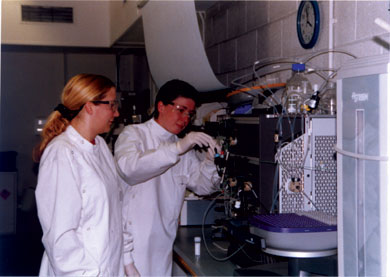| 2003 |

|
YEAR BOOK |
Institute of Technology Tallaght
|
Antimicrobial peptides - alternative to antibiotics?
|

Recently, antimicrobial peptides have been shown to display both antiviral and antifungal activities in vitro and have also been shown to be effective in experimental infections with multidrug resistant Staphylococcus aureus and Mycobacterium tuberculosis. Bacteriocin-producer cells identified to date have exhibited specific immunity to the action of their own antimicrobial peptide. Lactic acid bacteria, isolated from the natural flora of a number of fermented food products, have been demonstrated to produce a high diversity of different bacteriocins. The Lactic acid bacteria comprise a significant component of the human gut flora and have been associated with several beneficial roles in the gastrointestinal tract. Nisin, a natural bacteriocin isolated from Lactococcus lactis subsp. lactis, has been in commercial production since 1953 and is used to control bacterial spoilage in heat-processed and low pH foods worldwide. The US Food and Drug Administration (FDA) approval of nisin in 1988 for its use as a biopreservative in food elicited considerable additional interest in the potential biopreservation and therapeutic applications of other antimicrobial peptides produced by GRAS (generally regarded as safe) organisms.
The modes of action of antimicrobial peptides elucidated to date include inhibition of cell wall formation, formation of pores in the cell membrane resulting in the disruption of membrane potential with eventual lysis of the cell and, finally, inhibition of nuclease activity involving RNase and/or DNase activity. Bacteriocins have been demonstrated to have a broad spectrum of activity and can show synergy with other anti-microbial agents. They are stable over a wide range of pH values and have shown demonstrable in vivo activity. Treatment of susceptible strains has shown an absence of induction of resistant strains, and microorganisms resistant to antibiotics are generally not cross-resistant with antimicrobial peptides.
Research funded by the Technological Sector Research - Strand III at IT Tallaght initially involved screening of the college bacterial culture collection, and a range of potentially valuable novel antimicrobial peptide producing bacteria have now been identified. Microorganisms demonstrating antimicrobial activity have been purified, speciated and characterised. Detailed biochemical, microbiological and molecular biological characterisation of the peptides will allow classification of the bacteriocins into the different established bacteriocin classes and will result in a valuable database of antimicrobial peptides for further research.
The production of many bacteriocins is not inducible and relatively low levels of activity are normally detected. At IT Tallaght, optimisation of production conditions for selected peptide producing bacteria is being established and facilities are available to support the large-scale production and isolation of antimicrobial activities using fermentation technology. Peptides produced using fermentation technology are currently being purified and characterised with particular emphasis on microbiological assay of their spectrum of activity, determination of biosynthetic pathways, size and sub-unit composition analysis of the peptides. Additional funding has now been secured from the Higher Education Authority as part of a collaborative programme with the National Institute for Cellular Biotechnology at Dublin City University and the Department of Biology at the National University of Ireland Maynooth. The extra funding will be used to further develop the characterisation and potential application studies for both the bacteriocins identified to date, and the isolation and characterization of further antimicrobial peptides.
As part of this enlarged research programme at IT Tallaght, purified peptides of interest will be used as the basis for chemical synthesis of closely related peptides and peptidomimetics (peptide mimics) with potential for enhanced chemical, antimicrobial and stability properties.
Despite the application of antimicrobial peptides in the biopreservation of foods, little research has been carried out to evaluate the cytotoxicity of the peptides in mammalian systems. An additional objective of the studies being carried out at IT Tallaght is to develop in vitro cell culture systems for the evaluation of the potential cytotoxicity and immunogenicity properties of both the naturally isolated and other novel antimicrobial peptides.
Contact: Dr Mary Costello and John Behan,
Department of Applied Science, Institute of Technology Tallaght, Dublin 24; Tel: 01 4042806/816;
Dr Mary Costello; E-mail: [email protected] ;
Mr. John Behan; E-mail: [email protected] ;